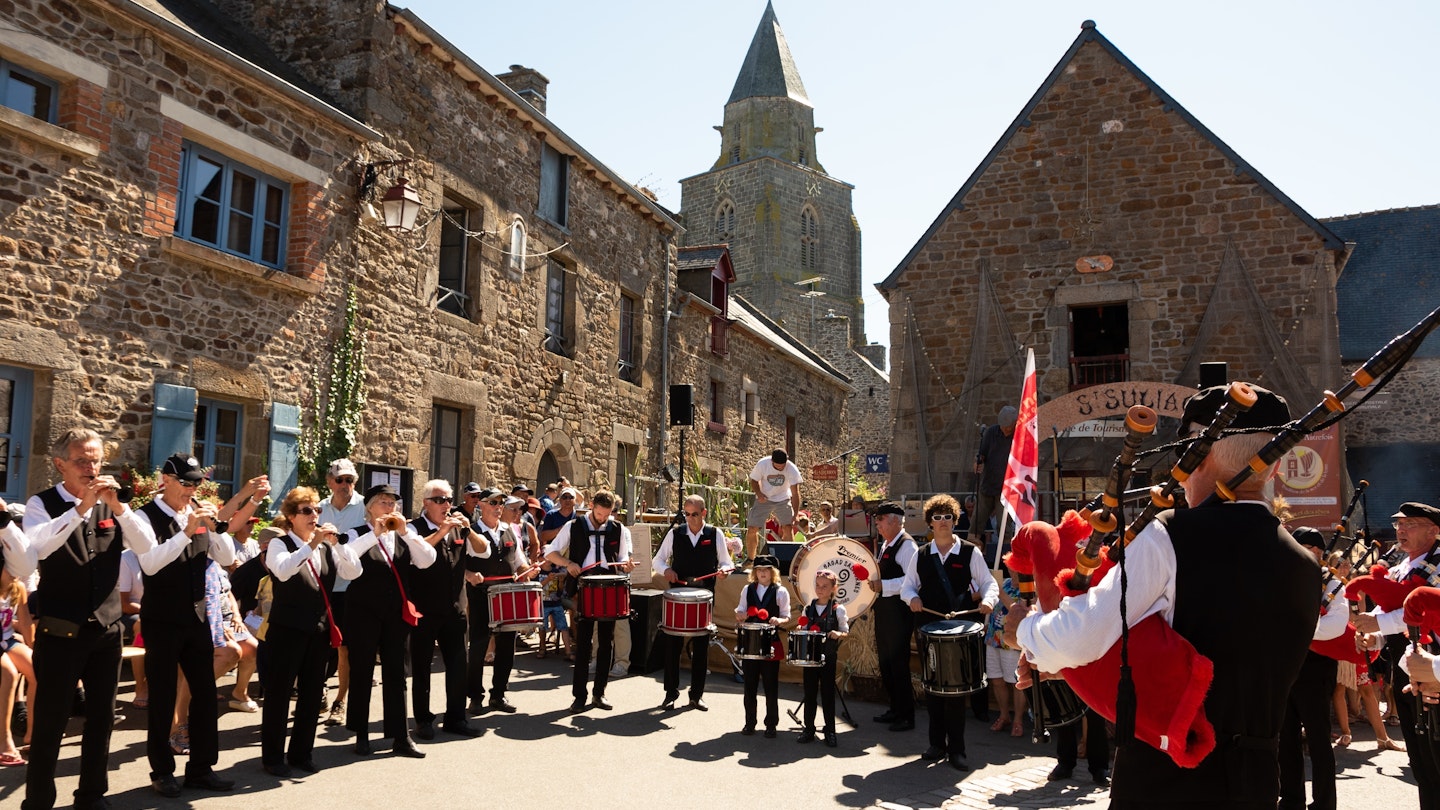Discovering Traditional Breton Music and Dance
It can be pretty intimidating to get involved with the Bretons once they hear the sound of a bagpipe – which usually sees them gather in a circle, lock pinkies, and set off for a little bit (or a whole night) of traditional dancing.
However, it’s not that scary at Lorient’s Interceltic Festival. A yearly event that gathers almost a million visitors and thousands of musicians and dancers from Celtic regions like Scotland, Ireland, and of course, Brittany, the festival is a joyful celebration that welcomes everyone. As I made my way from a street performance by Asturian musicians to one of the main stages to listen to an up-and-coming Breton band, I could have never anticipated that I’d find myself, hands locked on both sides with total strangers, in a large round of dancers expertly jumping from one side to the other.
Perhaps it was the couple of local beers I’d had earlier with my moules frites (mussels and fries), or the fact that both musicians and spectators patiently showed the steps to those who were novices. But even as a born and bred Parisian, I had never felt more integrated.
Why is Traditional Music and Dancing So Important in Brittany?
It’s difficult for anyone who is not from Brittany to fully grasp how important traditional singing and dancing are to the region. These cultural expressions are visible everywhere—from Friday evening gigs at the local bar to region-wide music and dance championships. More importantly, they are one of the essential ways in which the Bretons have defended their identity over the centuries.
Breton music and dance trace back to the Middle Ages, and have their roots in Celtic tradition. As early as the 14th century, Breton sonneurs emerged—local musicians who played wind instruments such as the bombard, a form of oboe, and the biniou, which resembles the bagpipes. These musicians played for people to dance at all kinds of social and religious events like weddings and threshings, becoming a defining part of everyday Breton life.
By the 19th century, Brittany had developed a rich and lively music and dance scene that prompted intellectuals to theorize about its significance for Breton culture, especially as the French state began cracking down on regional languages, including Breton.
Traditional music and dance were gradually marginalized by the Bretons in the first half of the 20th century. This decline coincided with a time when the region’s thriving culture was viewed unfavorably by the central state, further exacerbated in the aftermath of the world wars.
Nevertheless, a significant revival began in the 1950s. Musicians and dancers reignited their interest in Breton history and identity, leading to a “cultural revolution.” Influential artists like Alan Stivell modernized traditional Breton songs; the bagad emerged—a contemporary version of the sonneurs, now performed in bands—and the fest-noz developed as a type of gathering that celebrates festive dancing from prior centuries.
This period saw a resurgence of the Breton language as well, with the national ban on regional languages lifted in 1951 and organizations like Diwan beginning to establish French-Breton bilingual schools in the 1970s.
Where to Experience Traditional Breton Music and Dance Today
Today, traditional singing and dancing pervade Brittany. These art forms have significantly evolved, often merging with modern styles like rock and electro while incorporating global techniques. If you’re vigilant, it’ll be hard to miss opportunities to experience Breton music and dance: nearly every town and village, especially in summer, hosts local events featuring a bagad or a fest-noz.
Any occasion is perfect to take out the bagpipes and dance. Check what’s scheduled for Bastille Day on July 14; you’ll likely find open-air dances, traditional singing, crêpe stands, and fireworks. The same atmosphere can be found on August 15, when coastal towns celebrate the sea (Fête de la Mer), typically hosting a local fest-noz.
It’s advisable to stop by the local tourist office to check for any scheduled fest-noz during your visit or if local bagad and dance groups offer regular performances. For example, in Quimper, every Thursday evening during July and August, a free performance called Derrière les Remparts takes place with a bagad and a dance circle.

Numerous bands that identify themselves as Celtic or Breton have emerged, including electro-trad quartet Herriwenn, Celtic punk rock band Les Ramoneurs de Menhirs, and rock’n’roll group Soldat Louis. These bands perform in fest-noz, bars, festivals, and concert halls, so keep an eye out for their schedules.
Without a doubt, the most straightforward way to immerse yourself in traditional music and dance in Brittany is to attend one of the quintessentially Breton festivals held throughout the year. Lorient’s Interceltic Festival is just one of numerous events. Among Brittany’s standout occasions, you can also explore the Cornouaille Festival in Quimper, which showcases Breton culture in all its forms—music, dance, costume, food, drink, and even language.
In November, Rennes hosts the Yaouank music festival—dubbed the region’s largest fest-noz—where Breton, world, and contemporary music converge. Similarly, Tradi’Deiz in Vannes, held in April, draws thousands of professional dancers and musicians to its streets. Not to mention Pont-Aven’s century-old Festival of Gorse Flowers, which annually elects a festival queen based on costume, dance, and music abilities, and includes a variety of fest-noz and traditional music concerts.
If you enjoy what you hear, ensure you have cash on hand, as many artists sell their albums and branded merchandise for you to take home. As soon as the first notes of a bombard or bagpipe reach your ears, you’ll be transported back to that moment when you locked pinkies with a stranger, performed some kicks, and jumped rhythmically as the singer led the way. You may have felt uncertain at times, but the experience of engaging with Breton culture is undeniably enriching and offers a wonderful connection to the heart of the Bretons.





